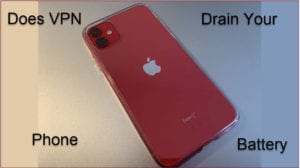As more people use smartphones, protecting your privacy is important. Smartphones came out first around the mid to late 90s, but Apple’s iPhone took the market by storm in 2007. Since that time, mobile usage has increased quite a bit. A recent report shows that users do about 60% of all internet browsing on a mobile device. Whether you prefer Android or iOS devices, battery life is important. Despite new phones and battery technologies, we are all limited by our mobile phone’s battery life. Since many factors can affect battery drain, many ask does a VPN drain your phone battery? Yes, but there are steps you can take to help it.
What Causes Phone Battery Drain with a VPN?
Let’s take a look at some battery-draining factors when using a VPN. Depending on the age of your phone or how long you’ve had it, battery life can be an issue. Just as with laptops and other battery-powered devices, the longer you have them, the worse your battery life can get. The age of your phone also affects charging efficiency. Both of those factors can affect how quickly your phone dies as well.
- Poor signal strength – Poor signal strength can cause a big issue whether you are connected to a VPN or not. That is because the phone has to increase the signal and power to be able to communicate. If your phone has to keep switching from WiFi, looking for WiFi, or searching for service, that can eat up your battery more quickly.
- CPU usage – Some phones perform better than others because of innovations. If your phone is not optimized for heavy usage or a bit older, the app’s extra weight can affect your phone.
- Encryption level – The encryption level you need may vary. The heavier encryption you use, the faster your battery is likely to go. That is because your phone has to put forward more effort.
- Background Use – Even when not using it, some VPNs will stay open in the background.
Since all of those factors can drain your battery, you’ll want to keep an eye on it.
How to Reduce Phone Battery Drain
From Androids to iPhones, there are a few things you can do when you are using a VPN.
- Use a router-based VPN on your home network – You won’t have this option if you are traveling. However, if you can do it, the router will handle the encryption instead. That way, you won’t have to worry about encryption drag.
- Check your settings – If the VPN has a battery saver mode or other power-saving options, you’ll want to use it. Also, take a look at some of the VPN features. Options like auto-connect are great, but they may start drawing power from your battery immediately. We suggest turning that feature and others off unless you are ready to use it. With some companies, you can also make sure that the VPN only connects when on an untrusted network.
- Don’t use the VPN all the time – Since VPNs drain power from your battery, having it on while not using it can quickly take resources from your phone, especially if your phone is getting older.
- Use a protocol with less overhead – Some VPN providers offer lower overhead protocols. Of course, you’ll still want to make sure you properly protect yourself before switching, but some options offer lower battery use without compromising security.
VPNs can drain your battery from 5% to 15% or more over regular usage, depending how you use your phone.

